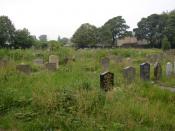The stanzas, ?Not God but a swastika? and ?A paperweight, / my face a featureless, fine / Jew linen,? are perfect examples of how Sylvia Plath brings to the reader?s attention the horrors of the holocaust. ?Lady Lazarus? and ?Daddy? are companion pieces in which the poet communicates her personal pain, suffering, and attempts at self-healing. Although Sylvia Plath?s poems ?Daddy? and ?Lady Lazarus? are about different subjects, through the use of imagery, allusion, metaphors, and similes the poet draws ones attention to the holocaust.
The poem ?Daddy? opens with a reference to the father?s black shoe, in which the daughter persona states, ?In which I have lived like a foot / For thirty years, poor and white, / Barely daring to breathe or Achoo.,? which suggest feelings of submissiveness and entrapment. The poem then moves to an idealized image of the father, ?Marble-heavy, a bag full of God,? suggesting to the reader that the speaker has a love-hate relationship with the father persona.
The father image is represented as a symbol of the Nazi oppression of the Jews. For example, the man at the blackboard in the picture of the actual father is transformed symbolically into the ?man in black a Meinkampf look.? The connecting link between each of these associations is the word ?black,? which also relates to the shoe in which the speaker has lived. The historical references allow the poet to dramatize her rebellion against the oppressive father and disown the deity turned demon in the declaration, ?Daddy, daddy, you bastard, I?m through.? Although ?Lady Lazarus? is about suicide and resurrection, the poet uses metaphors to equate her suffering with the experiences of the tortured Jews. As a result of the suicide she inflicts on herself she becomes a Jew. The public horrors of the Nazi concentration camps and the personal horrors of fragmented identities become interchangeable.
The reaction of the crowd, who push in with morbid interest to see the saved suicide, in stanzas 26 and 27, mimics the attitude of many to the revelations of the concentration camps. The poet use of similes, such as ?They had to call and call / and pick the worms off me like sticky pearls, and ?I am only thirty. / And like the cat I have nine times to die,? helps the reader to understand the depth of emotion the poet conveys.
Plath utilizes allusion to the bible in comparing her suicide to the victimization of the Jews, and when she later claims there is a charge for a piece of her hair or clothes and thus compares her rescued self to the crucified Christ. By comparing her recovery from a suicide attempt to the resurrection of Lazarus, she imagines herself as the center of a spectacle.
Poems like "Daddy" and "Lady Lazarus" are an intelligent play with concepts, myths, and language. Where she says, "I do it so it feels like hell. / I do it so it feels real. / I guess you could say I have a call;" she is making an allusion to the Bible. But unlike the beneficiary of the biblical miracle, Plath's "Lady Lazarus" accomplishes her own resurrection.
In both ?Daddy" and "Lady Lazarus, Plath makes references to her attempts and fascination with suicide, ?At twenty I tried to die / And get back, back to you.? and ?The second time I meant / To last it out and not come back at all.? Sylvia Plath, the American poet, committed suicide in 1963 at the age of 30. Her husband, Ted Hughes, who also was a poet, had recently left her. ?Daddy? and ?Lady Lazarus? she wrote in the last few months of her life. Her poems explore her relationships with her father and husband, and her belief that "Dying is an art, like everything else. / I do it exceptionally well.?





